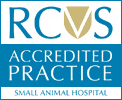Please click on the links below to find out more.
Why do I need to fast my animal overnight?
We will commonly ask for your pet to be fasted overnight before your visit to the hospital, this requires you to feed them their normal evening meal and then give no more food. Water should be available to your pet at all times until your consultation.
If your pet requires sedation or anaesthesia on the same day then having a full stomach can increase the risk of regurgitation of stomach contents. Regurgitation may lead to irritation or narrowing of the oesophagus or pneumonia if the regurgitated material is inhaled. Reducing this risk is one of our priorities.
Some specific animals such as very young puppies and kittens or pets with diabetes will receive different instructions from an anaesthetist depending on your particular circumstances. For puppies and kittens this is usually a shorter fasting time.
For pets with diabetes we will advise you about feeding time and insulin administration dependent on what time your consultation is and what procedures, if any, are likely to be performed.
What can I expect when I get my pet home?
Many patients will be discharged to you after having had sedation or anaesthesia for diagnostic procedures. Usually patients stay in the hospital for a day or two after surgery so we can monitor their recovery closely and provide pain relief. When your pet is discharged, you will receive detailed written discharge instructions from your consulting specialist detailing their medication and plan going forward.
If your pet had sedation or an anaesthetic on the day of discharge you may expect them to be a little quieter and sleepier than usual. We advise that cats are kept indoors overnight, and dogs are given short lead walks to go to the toilet. Provide your pet with somewhere warm and quiet to sleep. Some animals will have a reduced appetite, offering a bland meal such a chicken or white fish may help tempt them to eat but their appetite should increase as the after-effects of the anaesthetic wane.
What is the difference between sedation and anaesthesia?
Sedation involves the administration of drugs to produce a calm, relaxed patient that is conscious, aware but uninterested in their surroundings. We commonly sedate patients for non-painful procedures such as ultrasound and X-rays where we need the patient to lie still in a particular position for some time.
During sedation vital parameters such as oxygen saturation, heart rate, respiratory rate and blood pressure are continuously monitored. The anaesthetist will choose doses of sedatives to suit your particular animal and the procedure they need to be sedated for. Some sedative agents can be reversed at the end of the procedure to speed up their recovery if required.
During general anaesthesia we administer drugs which cause your pet to lose consciousness, then we pass a tube through the mouth into the trachea which allows us to deliver oxygen and anaesthetic vapour. Your animal will be unconscious, unaware and have no memory of the time they spent anaesthetised. General anaesthesia is used for surgery and non-painful procedures where sedation would be insufficient such as MRI. For specific cases we may request your consent to anaesthetise your pet for non-painful procedures rather than sedate them if we feel it is safer for your pet. General anaesthesia allows us to use smaller amounts of drugs, monitor their vital parameters more closely and pass a trachealtube which protects the airway against obstruction and aspiration of regurgitated stomach contents.
My vet said my pet was too old or high risk to anaesthetise, what does this mean?
Sedation and general anaesthesia do inherently involve a small risk, even in perfectly healthy animals. This risk is very individual and can be increased by what illnesses your pet has, the severity of that illness, their breed and age.
While we cannot eliminate any risk to your pet we minimise it as much as possible:
- Veterinary anaesthetists with advanced training in anaesthesia and analgesia examine and formulate an individualised plan for every case that is sedated or anaesthetised here.
- Veterinary anaesthetists are on call 24 hours a day 7 days a week to provide anaesthesia for emergency cases overnight.
- We can perform blood tests, ECG., heart scans and targeted ultrasound of the chest and abdomen, if needed, before sedation or anaesthesia to better understand the clinical status of your pet.
- We can hospitalise and closely monitor your pet to stabilise them before sedation or anaesthesia if needed.
- We have advanced monitoring modalities, drugs and equipment not usually available in general practice. This allows us to monitor your pet very closely to fine tune their anaesthesia and administer drugs to effectively prevent or treat complications arising under anaesthesia.
Your consulting specialist will discuss any specific risks to your pet in the consultation after taking a thorough clinical history and performing an examination. Should you wish to speak to an anaesthetist about any concerns you have you are welcome to request this.



